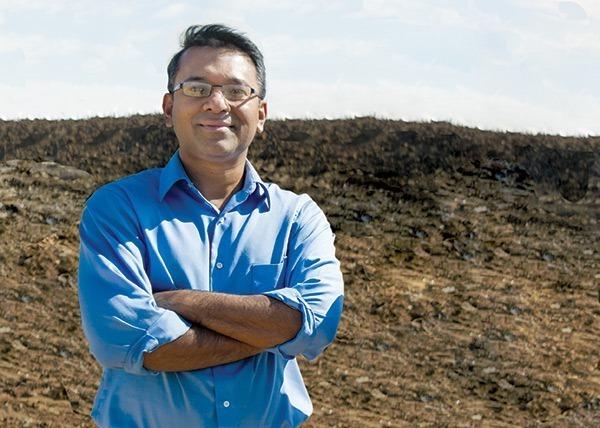UTA civil engineer using recycled plastic pins to stabilize bridges and highway slopes

Credit: UT Arlington
A civil engineering professor at The University of Texas at Arlington has received a two-year, $987,140 contract from the Texas Department of Transportation (TxDOT) to investigate the use of recycled plastic pins to repair deep-seated failures on embankments and the areas around highway bridges.
The pins are about 8-10 feet long and are driven into the slopes to provide stabilization, reducing costs by more than 50% when compared to conventional methods. In addition, the project, led by Sahadat Hossain, who also is director of the Solid Waste Institute for Sustainability, will test the feasibility of stabilizing slopes using just a moisture barrier and no other mechanical support.
Hossain has used recycled plastic pins extensively to repair shallow slopes in TxDOT’s Dallas district. Several other states, including Ohio, Maryland, Georgia, Iowa, North Carolina, South Carolina, Louisiana, Mississippi and Alabama, are considering doing the same in their highway slope repair following UTA’s successful implementation in Texas.
Some highways, however, experience slope failures deeper below the surface than the pins can reach. To repair these, Hossain is implementing a new technique where crews remove the soil about halfway to the location of the failure, insert rows of pins, then cover the area and insert more rows of pins to provide stabilization all the way to the surface.
Hossain is also testing whether a moisture barrier alone could effectively stabilize slopes. He currently includes a moisture barrier along with the pins to successfully prevent water erosion. TxDOT engineers want to know whether he can achieve the same results with only modified moisture barriers.
“We’ve had great success in using recycled plastic pins to shore up highway embankments in North Texas, and several other states are exploring the option now because we’ve proven that it works,” Hossain said. “As TxDOT has used our method more extensively, they’ve found that failures that are deep in the soil are harder, more expensive and time-consuming to repair. We’ve developed a different design and construction method to address that issue.”
Hossain’s research into using recycled materials for road construction and repairs includes a recent project to determine if recycled plastic can be incorporated into asphalt used in highway construction. These innovative approaches have established him as a leader in the field, says Ali Abolmaali, chair of UTA’s Civil Engineering Department.
“Dr. Hossain’s interest in using recycled materials is helping TxDOT and other departments of transportation across the U.S. to save money and be environmentally conscious,” Abolmaali said. “His innovative use of recycled plastic is making infrastructure sustainable.”
###
– Written by Jeremy Agor, College of Engineering
Media Contact
Herb Booth
[email protected]
Original Source
https:/




